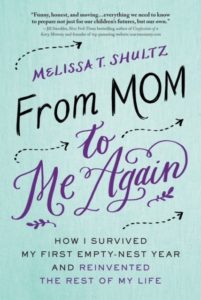How to Rekindle Your Marriage When the Kids Leave Home, by Melissa T. Shultz, author, From Mom to Me Again (Book Excerpt)
 Marriage and partnerships are hard work, and over many years, issues between two people, even in the best relationships, can get swept under the rug for a variety of reasons. The thing is, once the kids leave, it’s harder to avoid what you’ve been putting off talking about, even if it’s just small stuff that’s become exaggerated over time, like leaving toothpaste stuck to the sink. One of the hallmarks of happy couples is that they treat one another with kindness. When you’re kind, your partner feels loved, respected, and appreciated. Being overly critical keeps you from seeing the good and can erode the love connection.
Marriage and partnerships are hard work, and over many years, issues between two people, even in the best relationships, can get swept under the rug for a variety of reasons. The thing is, once the kids leave, it’s harder to avoid what you’ve been putting off talking about, even if it’s just small stuff that’s become exaggerated over time, like leaving toothpaste stuck to the sink. One of the hallmarks of happy couples is that they treat one another with kindness. When you’re kind, your partner feels loved, respected, and appreciated. Being overly critical keeps you from seeing the good and can erode the love connection.
I asked husband-and-wife psychotherapists, relationship counselors, and authors Linda and Charlie Bloom, who have been married since 1972, if you can learn to be more kind and loving toward your partner. Their short answer was yes. Hold that thought. The longer answer is you should probably figure out what the underlying reasons are for not being kind in the first place, so you don’t fall back into the same pattern of behavior. People who are unkind to their partner, says Charlie Bloom, “often treat themselves in unkind ways as well and project this onto their partner.” Linda Bloom says in actuality, it’s hard for people to reveal their inner emotional life, so very often the conversation is only going on in their own head. “They may not be speaking it or demonstrating it in a way their partner feels it,” she says. This really comes into play after the kids leave. If a couple has not been relating in an intimate way, things can deteriorate rapidly. “People tend to feel more comfortable turning toward the kids than toward their partner,” she says. And if you’re anger-phobic—that is, you don’t like to bring up issues for fear of getting angry and making a mess—the result is that you may end up with a larger, more complicated one.
So how do you open or reopen the lines of communication in a constructive way? Talk about these concerns with your partner, and seek outside help. There are lots of resources, from community and religious-based classes and workshops to online programs, professional counselors/therapists, and relationship coaches. The main difference between counselors/therapists and relationship coaches is that counselors/therapists are licensed by the state, have to pass certain tests and requirements, and focus on helping you find solutions as well as (if appropriate) look for underlying causes for behaviors. Relationship coaches are not licensed by the state and focus on helping you find solutions. Regardless of whom you choose, the advantage of seeing a good counselor/coach or therapist, says Charlie Bloom, is that “they can see options [that] couples are otherwise blind to.”
Ideally, you and your partner will work together when choosing a therapist to find someone you both like. I say ideally, because truthfully, often one of you takes the lead, at least initially. You should be able to ask the therapist questions about their experience, success rate for couples, the methods they employ, etc. Once therapy has begun, your counselor will try to help you focus on the ways in which you interact with one another—the things you say that perhaps are knee-jerk reactions, the way you do or don’t pay attention to one another, criticize, judge. They can’t do the work for you, but they can guide you, help you undo negative communication patterns, and try to make you aware of how you respond to your partner. The goal is to get you to focus your energy on the relationship itself so it is happier and to be more supportive of one another. If you choose to give some form of therapy a try, do it with good intentions. “You’re on the same team,” says Linda Bloom.
So much for talking—what about sex? What role does it play in a successful marriage after the kids leave? There are a variety of physical issues that can lead to a couple not having sex anymore, but for those not being intimate in any way, physical limitations are not usually the real cause—the quality of the relationship is. When there is an accumulation of anger and resentment, which can happen after years of putting off talking about issues when the kids are around, sexual desire is weakened. Keeping up “the love connection” is key to intimacy that lasts. And it can last: in a recent English Longitudinal Study of Ageing Project, researchers found that there are lots of men and women who are sexually active into their eighties. Simply kissing or touching releases endorphins and oxytocin that are “a great love cocktail,” says Linda Bloom.
The study reminded me of a story my grandmother once told me about a neighbor in her retirement home. He had several women chasing after him, even though he had a longtime companion, and he was legally blind and nearly ninety. The reason? “How well he danced,” she said. And by “danced,” I trust she really meant danced, not something else…but maybe not. Anyway, one day, his longtime companion was supposed to be out of town and came home early and found him in bed with another woman from the retirement home, and he fell out of bed and had to go to the hospital “because things were broken.”
What do men and women want from sex? The Blooms say that women report it’s the high quality of the sex rather than the frequency that they seek. And for men, it’s the frequency rather than the quality. Linda Bloom has found that most women are not being assertive and saying what they like, yet men want them to be direct. “Be honest, give them details…they do want to know,” she says.
Of course, there are other, more serious, reasons that partnerships don’t work out, including mental health issues, substance abuse, and physical abuse. For the couples who have figured it out, so far, at least, they encourage one another to grow as individuals while maintaining their bond. Journalist Jane Pauley has been married for thirty-four years. “I feel very happy in a nest of two,” she says, “though we have created more independent than interdependent lives in our empty-nest years. Our changing work lives have been a bigger dynamic of change and will be more so in years to come.”
Okay, what if you’re married to someone you love but feel you are no longer in love with? Whether it’s a question of kindness, intimacy, physical attraction, or maybe your relationship has just lost something along the way—can you get it back? Again, the short answer is yes. When someone says this (I’m no longer in love with my spouse), Linda Bloom hears something different: “What I hear is that they miss that aliveness and intensity…but we see evidence that it’s possible [to get it back].” It’s often quite a bit of work to do, she says, because the magnetism has drifted away, but that doesn’t mean that good feelings aren’t still there waiting to be reignited. It’s all about intention—showing that you want things to work out, that there could be more to the relationship that wasn’t possible before.
Winifred White Neisser, mom of two and a former television executive with NBC and Sony, says that after the kids left, she and her husband were alone in the house saying, “Who are you again? Now what do we do?” It didn’t take that long for them to adjust and to recognize that they could be a lot more spontaneous than they had been: On Saturday afternoon, we could decide, Let’s go to the movies tonight. We had just stopped doing all that stuff and instead were making sure we knew where the kids were and how they fit into the equation. I was thirty-six when I got married. My husband and I were only married a year before our first child was born. We had no married life where it was just the two of us. I think that was a concern that I was afraid to articulate: What if we find out now that all we had in common was raising our kids? What if we can’t figure out how to have fun just the two of us? Fortunately, that wasn’t the case.
The Blooms say that by the time a couple comes in for help, an average of six years has passed since they began having problems, and many are having serious difficulties. That, says Charlie Bloom, is why so many people give marriage counseling a bad rap. “They’ve waited so long, it creates new related problems—there’s just a huge backlog of problems, and by the time they get into therapy…when the kids leave home, they are…like psychic strangers.” He’s quick to add that everyone has some marriage issues, by the way. They know one another well because they have lived together for so long, but really, in many senses, they’re strangers to one another emotionally.
Create a plan or agreement for how to discuss things when and if they do get too tough to handle on your own, but do it long before they reach that point—like when things are peachy. A We’ll be together forever and everything you do is perfect, but if we ever start getting angry at one another, let’s go to a therapist or promise to watch the movie Moonstruck while eating oysters and making out sort of plan. The Blooms created a marriage  agreement of sorts themselves and have, on occasion, exercised it. Linda Bloom says it has given her great peace of mind over these many years because it helps her avoid conflict—you only need to remind one another of the agreement, and go get help. Sometimes “three heads are better than two,” she says.
agreement of sorts themselves and have, on occasion, exercised it. Linda Bloom says it has given her great peace of mind over these many years because it helps her avoid conflict—you only need to remind one another of the agreement, and go get help. Sometimes “three heads are better than two,” she says.
This article was excerpted and adapted from the book: From Mom to Me Again: How I Survived My First Empty-Nest Year and Reinvented the Rest of My Life by Melissa T. Shultz
NOTE: BOOK GIVEAWAY: We are giving away a signed copy of the book. If you would like to enter to win, please email [email protected] and indicate why you’d like to read the book. Please put FROM MOM TO ME AGAIN in the subject line. And, be sure to include your full name and mailing address.
















One Response to “How to Rekindle Your Marriage When the Kids Leave Home, by Melissa T. Shultz, author, From Mom to Me Again (Book Excerpt)”
Great post. It is so important to have time without the kids and continue to grow as a couple.
By susan on Oct 14, 2018